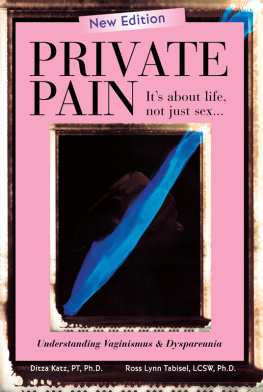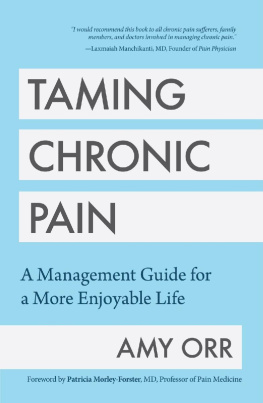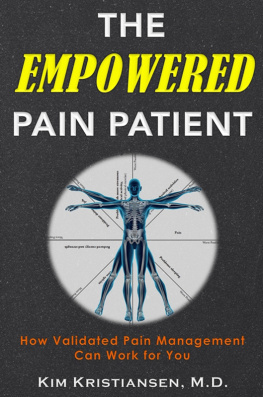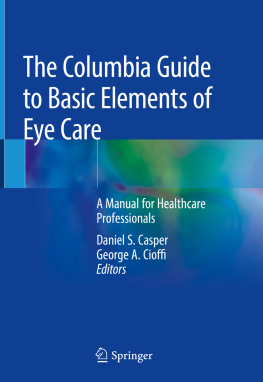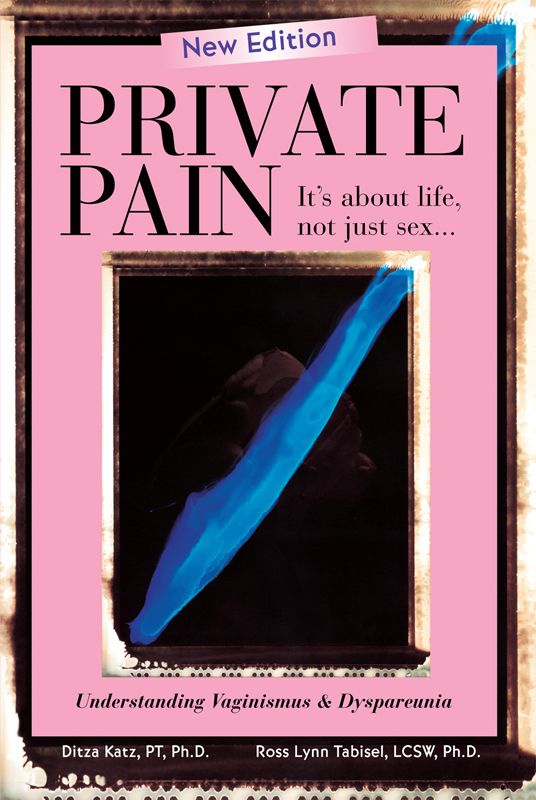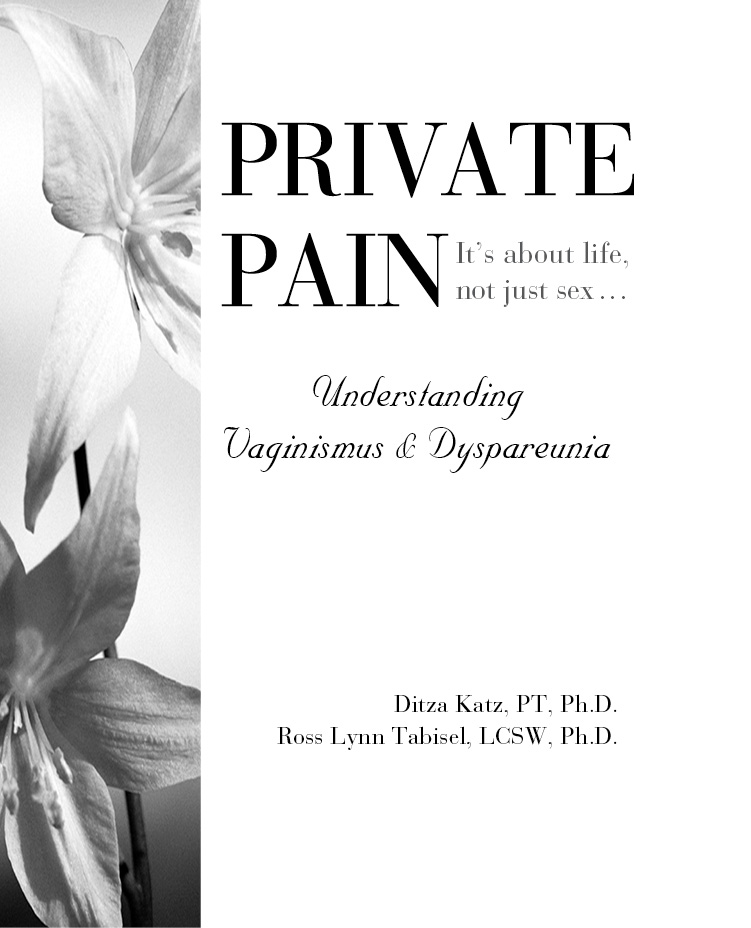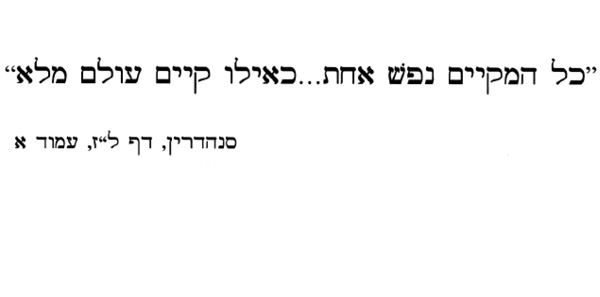Copyright 2013
by Ditza Katz, PT, Ph.D., and Ross Lynn Tabisel, LCSW, Ph.D.
Katz-Tabi Publications
Womens Therapy Center
54-A Sunnyside Blvd., Plainview, NY 11803
(516) 576-1118
www.womentc.com
All rights reserved, including the right to reproduce this book, or portions thereof, in any form.
eBook design by Mayfly Design ( mayflydesign.com )
Cover design by Steven Guddat
Front cover photograph by Talli Rosner-Kozuch
The information provided in this book is meant for educational purposes only and should not take the place of medical and/or rehabilitative care. Clinicians and other healthcare providers must undergo professional training and develop necessary expertise prior to treating vaginismus.
978-0-9700298-3-6 (softcover)
978-0-9700298-4-3 (ePub)
978-0-9700298-5-0 (Kindle)
E-book edition 2013
Whoever saves one life ... it is as if he had saved the entire world!
Sanhedrin 37:1
Acknowledgments
W e thank our patients for allowing us to enter their innermost personal space while in their worst moments of distress and desperation and, subsequently, in happier times. We also thank their partners and/or family members who joined the painful journey toward life. All of you were our teachers as we were your guides, and this book could not have been created without your contribution.
Special thanks and appreciation to the following individuals who devoted time and energy to reading the manuscript and giving us their thoughtful input: Barry Saltsberg; Linda Sinowitz, ACSW; Allie; Ann; Beth; James; Mike; and Tara.
We are most grateful to:
Dr. Heather Applebaum, Dr. Deborah Morgan Davenport, Rev. Dr. Marvin H. Dennis, and Rabbi Aaron S. Jacobowitz for believing in us and in our mission.
Dr. William Granzig for his support and guidance.
Sloane Jaclyn Tabisel for her research and for giving the Blue Line an eternal life.
Whitney Sara Sinowitz for conducting her research and for typing the result.
The doctors, members of the clergy, nurses, and other colleagues who embraced our pioneering work.
And to the following patients and partners who shared their intimate thoughts and feelings for the book: Allie, Ann, Beth, Christina, Dawn, Eric, Eve, Howard, James, Jennifer, K.C., Katy, Kim, M.K., Mike, Paco, S.B., S.M., Stefania, Tara, Tracy Morgan, Valerie, Bennett, and those who wished to stay anonymous.
Ross Dedication
I dedicate this book to my children, Brett and Sloane.
Brett, you challenged me as a mother from the day you came into this world. From the time you were little, I always knew that you had a mind of your own, and once your heart took you to what you wanted to do, you went with it. No mountain was too high for you to climb. As you got older, you never looked back. You continue to believe in who you are and follow every dream you have. I admire your talents, perseverance and kindness. I thought watching you perform as a professional actor would be the proudest moment of my life, but recently I was able to see you marry your two best friends and I was able to see the wonderful man you have become. You held a group of people together and no one uttered a word. You could feel the warmth you exude and the love you have from all of your friends. If that is not enough every day you work hard at your position at LPR and now have been rewarded as the general manager. I am so proud of you. Although you get embarrassed when we talk about my being a sex therapist, I know how you feel about my work and how proud you are of me by the strength of your hugs. This book is my gift to you!
Sloane, you have been a part of this book from the day it was first conceived. You have always been my inspiration. You have always cared so much for everyone, and always understood the time I needed to spend on my work. You never complained about the many meals we had to eat out, but rather took it in stride, saying, We are a different family. You encouraged me to pursue my work even if it meant that you gave up on some activities with your friends. Your own determination allowed me to keep going no matter how tired I was. You lived this book with me and happily became a part of it, never worrying if you would get teased by others and took it on as yours. Eagerly you worked on two chapters in the book and your Blue Line Chapter has already inspired many women as we enter the third printing of the book. My deepest respect goes out to you, my Sloane, for holding on to your Blue Line even if it is directed towards me. I no longer worry about our work being carried on as I know you will continue to carry the torch and keep our work alive. Sloane, you are an exceptional young woman and I am so proud of you. This book is a piece of my heart that I share with you.

To my husband Lenny, thank you for being you. You are the kindest, most caring man and I feel fortunate we what we have. People laugh when I tell them I never cooked a meal for you in all our married life, but because of the love we have you accept me for who I am and I accept you. I love you with all my heart and my ability to help women would not be as easy if you were not you.
Lastly, I want to thank my business partner and very special friend, Ditzashe knows the reasons why.
Ross
Ditzas Dedication
To my mother:
A15975 This is her identification number. It is tattooed on the inside of her left forearm, in blue color. She knows this number very well. I was never called by my real name, she would explain. She can recite it clearly unlike her social security number, which does not stick. She heard her ID number called out for attendance twice daily. It designated her job. It became a vehicle for discrimination. And she has it, forever, as a reminder.
Shula (Zita) was seventeen years old, healthy and strong, when she was chosen to work in the death camp of Auschwitz. Her job was to dig water channels and to clean the gas chambers of ashes that only a few hours earlier were living people, just like her. Perhaps she even knew some of them, in a different form.
Her twin sisters had tattoos as well. They were designated to the experimental section of Auschwitz, undergoing medical and gynecological torture to explain the differences between the perfect (Aryan) race and the others....
I must have first seen the tattoo when she cradled me in her arms, her newborn daughter, just five years after the liberation from Auschwitz. I never thought twice about it. I believed that every mother had a tattoo, and I would have one too when I became a mother. I learned the truth when I started school. Growing up in Israel, I was surrounded by survivors with emotional and physical tattoos. It was a way of life to see them, to hear their stories, to witness their pains, and to look, in vain, for answers and explanations for this horrific event of life.
And I clearly remember my Moms personal struggles. How, to this day, she must have a glass of water next to her bed. How she must have food available at all times. How she gets a knot in her stomach upon leaving on a trip, even a happy family vacation, a reminder of the transport trains to the camps. How she cannot approach the authorities with the simplest of requests, such as filing a document or asking the doctor to explain.

